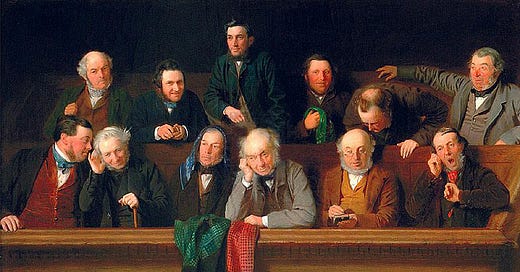Trial by Jury
An IllAdvised opinion on the state of Trial by Jury in our 'Justice' system
One of the most ignored or, perhaps, denied phrases in the Constitution is this idea of ‘trial by jury’. As anyone who has studied the legal system for any time at all should know, we don’t have ‘trial by jury’. We have trial by judge and ‘system’, with a jury present. Sometimes.
First of all, let us discuss this idea of ‘rules of evidence’. The other day I heard about a case where a judge ruled that they weren’t accepting something as evidence. And it was a trial by judge. So the judge read the evidence, decided it wasn’t valuable evidence, and told themselves to forget it. Stupid, right?
But not so stupid when he does it to the jury. When the judge reads or listens to the evidence and then decides whether or not the jury gets to hear it. This obviously makes a mockery of the idea of ‘trial by jury’, cause it ain’t trial by jury if someone else gets to decide what they hear. Delete enough evidence and you can get anyone to believe anything. (There is a trope in the legal profession that says that a prosecutor could get a grand jury to indict a ham sandwich.)
It is bad enough when the judge does so for the prosecution (see Poison Tree). But the standard for conviction is ‘beyond a reasonable doubt’… so what if the judge has just eliminated something that might cause the jury to have a reasonable doubt? I read of a case where the judge forbade the defence from mentioning ‘why’ the defendant did something. Something that is a staple in criminal trials: motive, was outlawed… because it might cause the jurors to have a reasonable doubt.
(At this point someone might say, “But, Von, he was required to eliminate it because of this or that rule”. See ‘It’s Not a Game!’. I am discussing the justice or lack thereof of the system, not castigating this or that judge, no matter how much they may need castigating.)
The whole point of having a jury is that it puts real people into the justice system. Justice is a human issue, we cannot merely add up the ones and zeros. The fact that juries might take certain things into account, or dismiss certain things, or treat the law in a different way than the judge, prosecutor, or legislature is not a bug. It is not even a feature. It is the point. It is the very reason we have juries in the first place.
In the end every single ‘innocent’ verdict is a form of jury nullification. The prosecutor, at least theoretically, had enough evidence to convict. The judge believed the law was being correctly followed in convicting. But the jury said no.
Now if someone says, “Oh, but Von, the judge knows the law way better than the jury does…”, I have two answers. First of all, in any rational system the law needs to be based on the understanding of the common man, not a judge. You cannot say that a common man should be held guilty of violating a law that you say that common man cannot understand!
And secondly, I read Supreme Court briefs and opinions for fun. They are one hundred percent based on differences of opinion, by judges, on what the law means, thus what the law is. There are times when a defendant is literally confirmed in their conviction, or released from it, because of the views of five of the nine justices on what the law is. So why one should believe the trial judge on the issue is beyond me. And that his view should prevail when the constitution and common sense call for trial by jury is insane.





Having sat on a Jury I can attest that even the rules they suggest like 'you aren't here to judget the law' are actually illegal to say because the Jury can nullify a law. Moreso, most juries are not a jury of peers. What you have is a jury of older, lower-middle class who have enough money to take the time off and not enough responsibilities to make them forego it. It's basically a jury of bored old people.
As a wag once noted, juries are made up of people too dumb to know how to get out of jury duty.
I've been a juror three times so far...